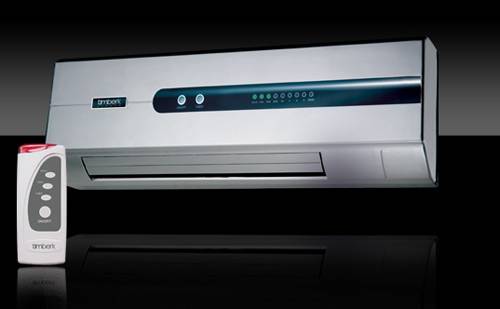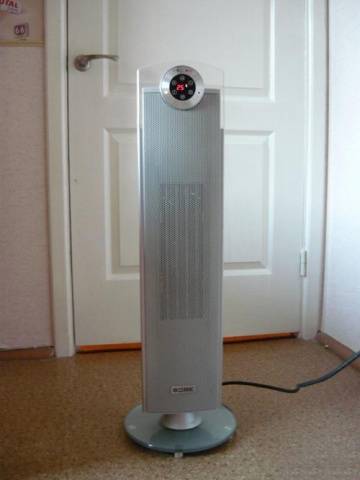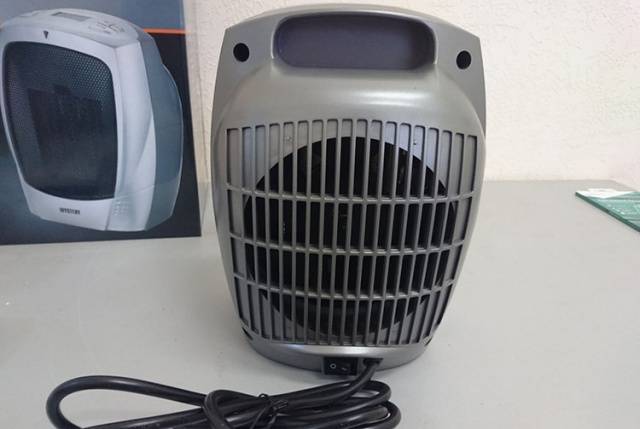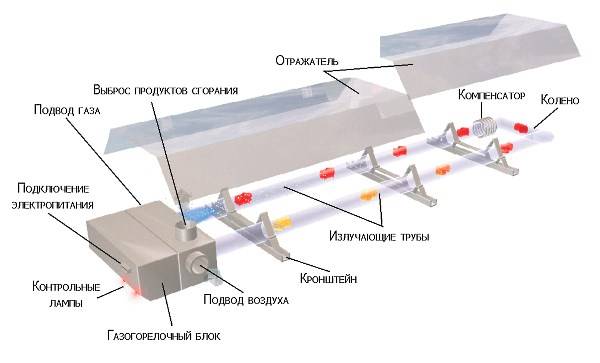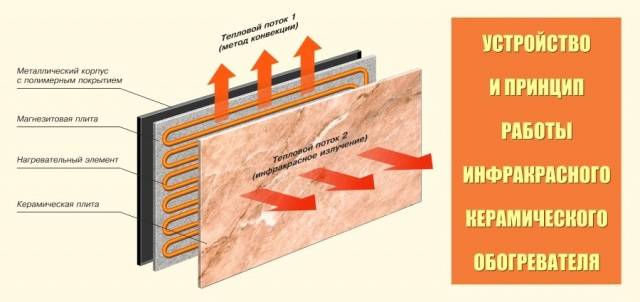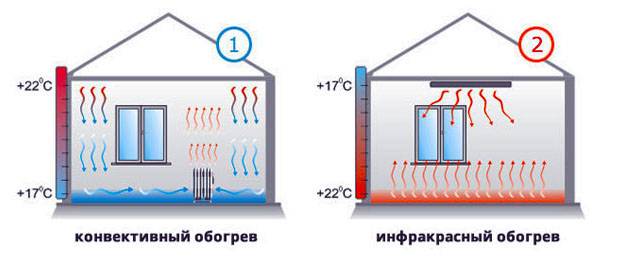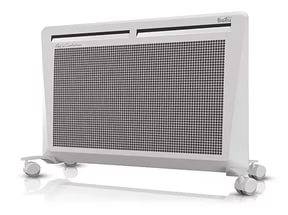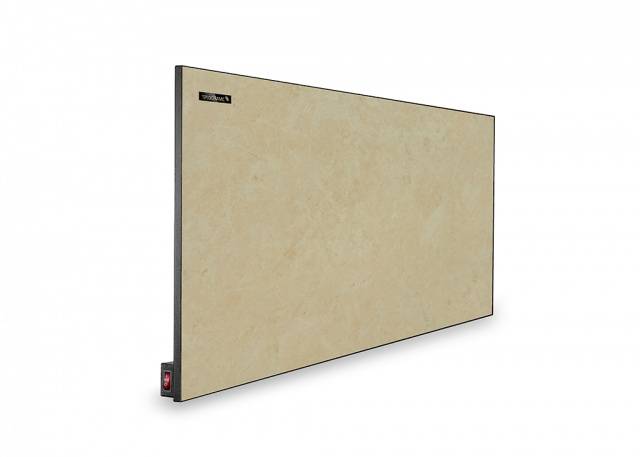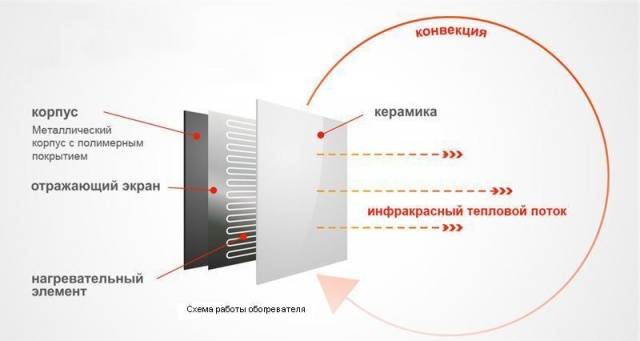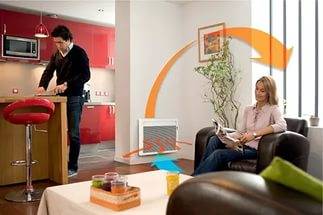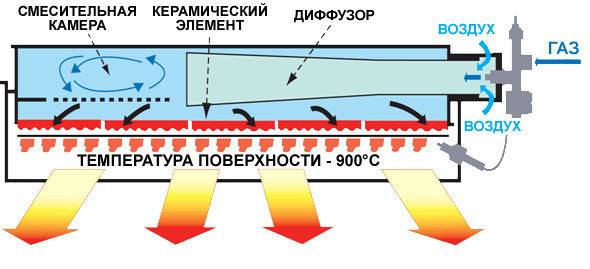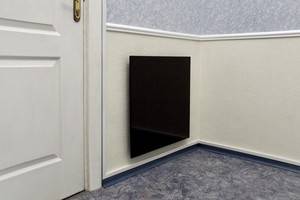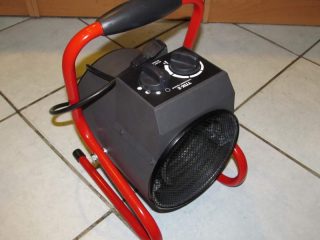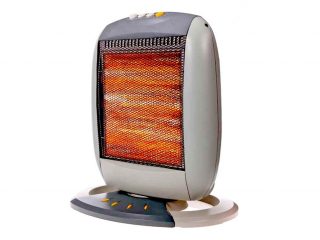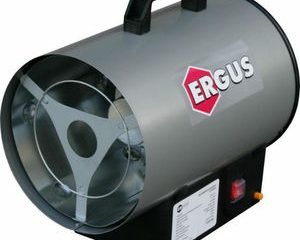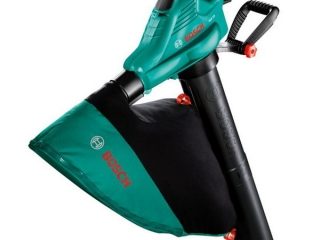Content
- 1 The difference between devices by the method of placement
- 2 The difference between devices according to the method of obtaining energy
- 3 The difference between heaters in the heat supply system
- 4 Advantages and disadvantages of ceramic heaters
- 5 Mobile ceramic heater
- 6 What users say about ceramic heaters
Until recently, oil radiators were the most popular, but their disadvantage was high energy consumption. The outdated models were replaced by ceramic heaters powered by gas and electricity. In terms of energy consumption, these units are more economical. Ceramic heaters for summer cottages have become very popular, allowing you to quickly heat up the room upon the arrival of the owners.
The difference between devices by the method of placement
For ease of use, ceramic heaters are produced in several types, differing in the way they are placed. Let's find out what they are.
Wall models
By the type of fastening, wall heaters resemble traditional radiators. It is enough to hang the ceramic panel on any free part of the wall, and it is ready to work. Since warm air always tends to rise, it is better to hang the panels at the bottom of the wall. Wall heaters are produced in different sizes, thicknesses and shapes. Some of the more expensive electronic controls are similar in design to an air conditioner.
The size and power of the unit are selected according to the area of the heated room. In large rooms, several panels are hung on the walls. If heaters in the country are needed for permanent operation, then they prefer models with a built-in thermostat or install a control device separately.
Floor models
Floor-standing ceramic heaters are very easy to move. Mobility allows you to quickly move the unit to any room and heat it. Floor standing heaters are equipped with an accidental rollover protection system. If the device was pushed by children or fell for some other reason, the automatic device will turn off the power.
Models equipped with a special rotating stand are very convenient to use. This system allows you to heat the air not in one direction, but throughout the room around its axis.
Tabletop models
For additional heating of a small room, there are tabletop ceramic heaters. By their design, they practically do not differ from floor counterparts, only perhaps in smaller sizes. Their appearance resembles a conventional fan heater. Manufacturers are trying to improve the design of heaters to increase their practicality. Table models are also equipped with a rotation system. It is convenient to put such a device on the table in the office or near the bed.
The video provides an overview of the ceramic heater:
The difference between devices according to the method of obtaining energy
A ceramic heater is capable of operating from several energy sources. It can be mains natural gas, bottled propane-butane and traditional electricity.
Gas units
The ceramic gas heater works, both from the main and from the cylinder liquefied gas. The unit is completely safe.A special ceramic heater is installed inside the body, inside of which flameless combustion takes place. Gas is supplied to the burner through a pipe from the main line or through a hose from a cylinder.
You can buy a gas heater for a summer residence in order to install it in a gazebo, veranda, garage and other open spaces. Most often, devices are made of impressive dimensions. However, in terms of cost, gas models are cheaper than electric counterparts.
Electrical aggregates
Ceramic heaters that run on electricity are best suited for heating living spaces. The design of the device consists of the same ceramic heater, only instead of a gas burner there is an electric heating element. The heaters are compact, well-designed and equipped with multi-stage automatic protection. The complete safety of using an electrical device allows it to be installed to heat a children's room.
The difference between heaters in the heat supply system
The design of any ceramic heater, regardless of whether it is gas or electric, has the main working element - a heater. It usually consists of several ceramic plates connected to form one plate. Thanks to this configuration, heaters are often referred to as ceramic panels. However, depending on the device of the plate, the operation of the device differs in the supply of heat.
Convectors
Convectors are the most demanded devices for heating a summer cottage. Thanks to its mechanism of work, the unit is able to heat a large space. The ceramic heater is evenly warmed up by a heat source, be it a gas burner or an electric heating element. Small fans are installed inside the convector body. They capture cold air and feed it to the hot ceramic heater. As it warms up, hot air is forced out of the chassis through the vents and into the room. Further, the convection cycle is repeated.
Infrared panels
Infrared heaters work and are arranged according to a different principle. Inside the body there is the same ceramic heater, inside which there can be an electric heating element or a gas burner. However, the ceramic element has a special structure. When heated, it does not emit heat, but infrared radiation. Radiation comfortable for humans is considered to be the range from 5.6 to 100 microns. Most household IR devices operate in this range. An exception may be long-range and short-range infrared heaters operating in other ranges, but such models are used only in production and in large non-residential buildings.
Infrared radiation is completely safe for humans. The panel itself does not heat up much, which eliminates the possibility of getting burned on it. In terms of energy saving, infrared panels are more profitable than convectors. Infrared rays do not burn oxygen in the room, which is important for human health. The service life of infrared devices reaches 30 years, they are distinguished by a beautiful design, the ability to mount anywhere, even on the ceiling.
The principle of operation of IR ceramic heaters is as follows:
- The waves emitted by the heater heat up all surfaces of objects in the path. This includes walls, ceiling, floor, furniture. In general, everything that is in the room.
- In turn, objects warmed up by infrared rays give off their heat to the air. It turns out that the air is warmed up not from IR rays, but from the warm surface of all objects.
Infrared heating is also based on the convection principle. Cold air from the room passes through the ceramic element. After warming up, he goes into the room, giving off heat to objects. That is, the principle of thermal solar radiation is obtained.
Advantages and disadvantages of ceramic heaters
Ceramic heaters are economical and safe.Due to the fact that the plates do not overheat, there is no threat of oxygen burning and fire in the room. The devices are convenient to use in poorly ventilated and humid rooms. Ceramic models have smaller dimensions compared to oil counterparts, and the heating of the area from them is much greater. The mobility of the devices allows you to bring them with you to the dacha in a car and quickly install them anywhere.
The only drawback is the high cost of the products. No other disadvantages have yet been identified.
Mobile ceramic heater
Each summer resident has a non-residential premises that require periodic heating. It can be a garage, a barn, an open balcony, etc. Someone likes to go out into nature with a tent in the fall. For these purposes, it is very convenient to have a mobile IR device at hand, powered by a small bottle of liquefied gas.
The combustion of the gas takes place inside the ceramic heater without the formation of a flame. There are models that can heat ceramic tiles up to 900aboutC. It is convenient to cook food on them while hiking. The disadvantage of a mobile device is the point heat supply, which does not allow heating a large space.
The video provides an overview of the gas heater:
Ceramic heaters are the best solution for heating a summer cottage. Thanks to the rapid convection, the room instantly becomes warm. Even after switching off, the ceramic plate cools down slowly, continuing to heat the room.
What users say about ceramic heaters
Before giving preference to a particular model during the purchase, you must read user reviews on the forums in advance. This will help you see all the advantages and disadvantages of a particular device.
